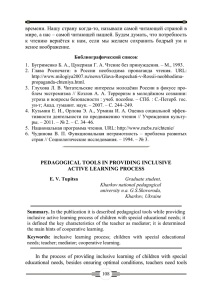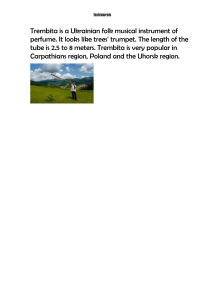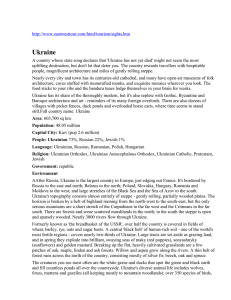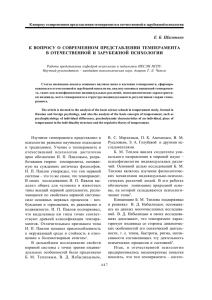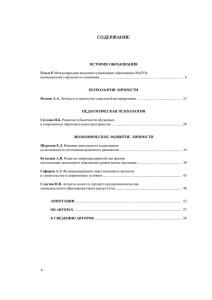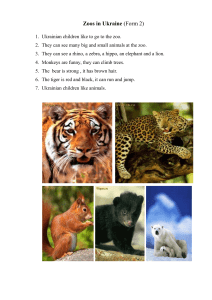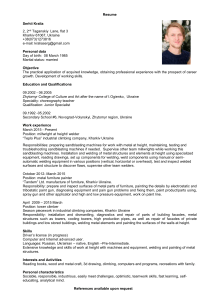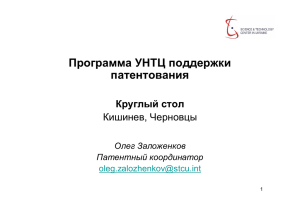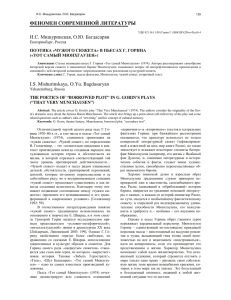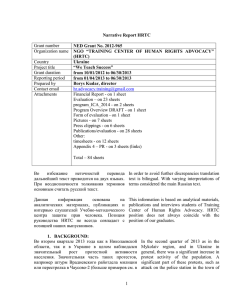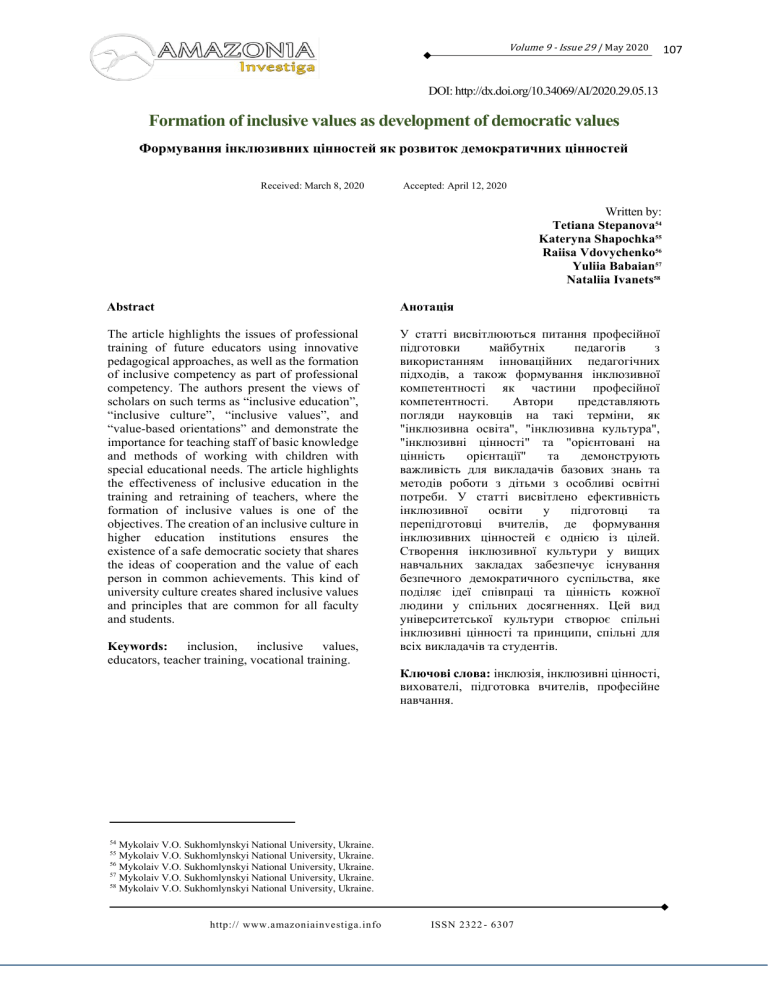
Volume 9 - Issue 29 / May 2020 DOI: http://dx.doi.org/10.34069/AI/2020.29.05.13 Formation of inclusive values as development of democratic values Формування інклюзивних цінностей як розвиток демократичних цінностей Received: March 8, 2020 Accepted: April 12, 2020 Written by: Tetiana Stepanova54 Kateryna Shapochka55 Raiisa Vdovychenko56 Yuliia Babaian57 Nataliia Ivanets58 Abstract Анотація The article highlights the issues of professional training of future educators using innovative pedagogical approaches, as well as the formation of inclusive competency as part of professional competency. The authors present the views of scholars on such terms as “inclusive education”, “inclusive culture”, “inclusive values”, and “value-based orientations” and demonstrate the importance for teaching staff of basic knowledge and methods of working with children with special educational needs. The article highlights the effectiveness of inclusive education in the training and retraining of teachers, where the formation of inclusive values is one of the objectives. The creation of an inclusive culture in higher education institutions ensures the existence of a safe democratic society that shares the ideas of cooperation and the value of each person in common achievements. This kind of university culture creates shared inclusive values and principles that are common for all faculty and students. У статті висвітлюються питання професійної підготовки майбутніх педагогів з використанням інноваційних педагогічних підходів, а також формування інклюзивної компетентності як частини професійної компетентності. Автори представляють погляди науковців на такі терміни, як "інклюзивна освіта", "інклюзивна культура", "інклюзивні цінності" та "орієнтовані на цінність орієнтації" та демонструють важливість для викладачів базових знань та методів роботи з дітьми з особливі освітні потреби. У статті висвітлено ефективність інклюзивної освіти у підготовці та перепідготовці вчителів, де формування інклюзивних цінностей є однією із цілей. Створення інклюзивної культури у вищих навчальних закладах забезпечує існування безпечного демократичного суспільства, яке поділяє ідеї співпраці та цінність кожної людини у спільних досягненнях. Цей вид університетської культури створює спільні інклюзивні цінності та принципи, спільні для всіх викладачів та студентів. Keywords: inclusion, inclusive values, educators, teacher training, vocational training. Ключові слова: інклюзія, інклюзивні цінності, вихователі, підготовка вчителів, професійне навчання. 54 Mykolaiv V.O. Sukhomlynskyi National University, Ukraine. Mykolaiv V.O. Sukhomlynskyi National University, Ukraine. 56 Mykolaiv V.O. Sukhomlynskyi National University, Ukraine. 57 Mykolaiv V.O. Sukhomlynskyi National University, Ukraine. 58 Mykolaiv V.O. Sukhomlynskyi National University, Ukraine. 55 http:// www.amazoniainvestiga.info ISSN 2322 - 6307 107 Stepanova, T., Shapochka, K., Vdovychenko, R., Babaian, Y., Ivanets, N. / Volume 9 - Issue 29: 107-115 / May, 2020 Introduction The priority of Ukranian educational policy is the humanization of education, i. e. the integration of children with impaired mental or physical development in the educational space, as well as the socialization of people with special needs. The Ukrainian strategy for the development of education is aimed at improving the quality and competitiveness, applying innovative approaches to learning, following the recommendations of the European Parliament and the Council of the European Union (EU), and ensuring equal opportunities for education and further integration into the society of every person (Kolupaeva, 2009). The Mykolaiv National University named after V.A. Sukhomlinsky is the main university in the south of Ukraine, which trains teachers and tutors. The structure of the Mykolaiv region includes 19 districts. Each has its administrative center. The city has 5 regional and 4 district cities, 20 urban-type settlements, and 919 villages. The population of the Mykolaiv region is almost 1.31 million people (2.6 per person of the total population of Ukraine). Most of the population lives in urban areas. The Mykolaiv region has a culturally diverse population. The region is home to more than 100 nationalities and ethnic groups. Most of them are Ukrainians (75 ???) and Russians (20 ???), but Moldovan, Bulgarian, and Greek communities are also represented. Therefore, future teachers should be prepared to work with children with special educational needs (SEN), including various groups of minorities, children with learning difficulties, children from conflict zones/child soldiers, children from poor backgrounds, refugee children or displaced children, and others. Currently, the problem of people with special needs is becoming increasingly serious in Ukraine. The government launched the New Ukrainian School project in September 2018. There are various programs to prepare teachers for work in the New Ukrainian School. However, changes must begin from the first level: first comes the training of future educators and then the changes in pre-school, primary, and secondary school education. The reason why we propose such an order is that the task of the teacher is to help less successful people become full members of society. The teacher should support more than one way of transferring knowledge, combine various assessment methods, and overcome barriers. www.amazoniainvestiga.info The introduction of inclusion in preschool, school, and high school practice involves multidimensional, complex changes. For many educators, this process is complicated and requires a lot of time to study and apply the gained theoretical knowledge in practice. The New Ukrainian School is associated with the awareness of new opportunities for children and teachers and the ability to meet the educational needs of all students. The teacher of the New Ukrainian inclusive preschool/school must constantly develop, deepen knowledge of the laws of the development of children, master modern technologies for training and education, as well as promote the socialization and integration of children with SEN. The Law of Ukraine “On Education” adopted by the Verkhovna Rada and signed by the President defines the conditions for providing education to people with SEN (Articles 19, 20). The teacher’s activities are sufficiently regulated by the curriculum, programs, and student achievement requirements. However, the implementation of these objectives is possible only if additional specialized knowledge is obtained that will ensure the implementation of special and developing program goals, depending on the characteristics of the educational and cognitive activities of students with SEN (speech development, development of auditory perception and pronunciation, spatial orientation and mobility, communication skills, etc.). The issue of the professional competency of teachers is extremely relevant. Almost all educational institutions have children with SEN. Thus, for educators, it is extremely important to have basic knowledge and master the methods of working with children with SEN. A well-balanced personnel policy with continuous training of teachers, considering the specifics of the educational and cognitive activities of children with special needs of a certain category and the creation of conditions for their education in preschool and school institutions, will contribute to the introduction of innovative technologies in the educational and rehabilitation process and will increase indicators in education, parenting, and socialization of children with special needs. ISSN 2322 - 6307 108 Volume 9 - Issue 29 / May 2020 Scope The development of modern society requires a broader definition of the term “inclusive education”. In global educational practice, this concept is considered multidimensional. However, in Ukrainian public opinion, SEN and individual opportunities are often associated with one category of students, i. e. children with mental and/or physical disabilities or health problems, while there are other categories of students, such as gifted students or students with a different cultural or linguistic background, who also have SEN. This means that inclusive education should concern the educational community, consisting of people of different nationalities, religions, cultures, social statuses, mental or physical abilities, interests, and so on. It also means that any educational institution can be heterogeneous in its organizational structure. In this regard, in society, especially in various educational institutions, it becomes necessary to create an inclusive culture based on the understanding of inclusive education as an opportunity for different people to receive highquality education at different levels depending on their gender, nationality, language, physical, mental, social, or other characteristics. Schools should be adapted for people who have different educational needs and opportunities but study together. The importance of inclusive culture is shown in the “Inclusion Index” by T. Booth and M. Ainscow (2011), where the authors present inclusion indicators in the form of a triangle and place the aspect of “creating inclusive cultures” along the base of the triangle. This means that the development of shared inclusive values and collaborative relationships can lead to changes in other dimensions, namely “developing inclusive policies and developing inclusive practices” (Booth & Ainscow, 2011). Thus, an inclusive culture created at universities influences educational policies and practices, as well as public opinion, and serves as a catalyst for positive changes in the direction of recognition of diversity. This becomes “an approach that aims to transform education systems and learning environments to account for and respond to the diversity of all students” (Mazurek & Winzer, 2015). According to N. Pless and T. Maak (2004), inclusive culture is “an organizational environment that allows people with different http:// www.amazoniainvestiga.info backgrounds, attitudes and thinking to work effectively together and use their highest potential to achieve organizational goals based on sound principles” (Pless & Maak, 2004). Creating an inclusive culture in higher education allows developing a safe democratic community that shares the ideas of cooperation and the value of each person in common achievements. This kind of university culture creates shared inclusive values and principles that are common for all faculty and students. In this inclusive culture, values and principles influence decisions regarding university policies and everyday educational practices. The development and improvement of universities are becoming an ongoing process. Effective inclusive education is possible only with the training and retraining of teaching staff, where one of the tasks is the formation of inclusive values. Inclusion is not possible without the introduction of inclusive values. The study of universal values, problems of human spirituality, and factors of its development has become an essential need for education since these values are a kind of connection between the past and present of Ukrainian and global pedagogical science (Stepanova, 2009). Values guide action. Developing a clear understanding of the connection that exists between values and actions is a practical step in the formation of value categories. For the development of inclusive education, all values must be respected. Description We support the idea that inclusive values are the main guiding lines and steps to action that help overcome exclusion and increase everyone's participation. The key values are equality, rights, participation, community, respect for diversity, sustainable development, non-violence, trust, compassion, honesty, courage, joy, love, hope, and beauty. Inclusion is the incorporation of inclusive values into daily activities (Booth & Ainscow, 2011). Factors that influence the formation of readiness to work in an inclusive educational environment: • • • • • Inclusion Inclusive education Inclusive educational environment Concept of the New Ukrainian school Innovative approaches to the education of children with SEN ISSN 2322 - 6307 109 110 Pedagogical conditions for the formation of readiness of future specialists to work in an inclusive educational environment: 1. 2. 3. 4. Recognition of the values of inclusive education as criteria for professional activities (equality, rights, participation, community, respect for diversity, sustainable development, non-violence, trust, compassion, honesty, courage, joy, love, hope, and beauty). The relationship of educational material from different disciplines of the professional-pedagogical cycle. The inclusion of students in effective professional cooperation (pedagogical practice, coeducation, mentoring, communication). Improving the professional competency of future professionals (cognitivemotivational, reflective, communicative, multicultural skills, etc.). The structural and functional model for optimizing the training of future specialists for work in an inclusive educational environment that can implement inclusive values in practice has been developed in stages. The first stage (theoretical and methodological) is aimed at analyzing the scientific literature on the problem, as well as study and analysis of the current state of training of future professionals for work in an inclusive educational environment. We defined the essence of the following concepts: “inclusive educational environment”, “inclusive values”, “children with SEN”, and especially “upbringing and training of children with SEN”. The theoretical and methodological basis of the study was made up of general philosophical, psychological, and pedagogical conceptual approaches that reveal the specifics of the development of a child with SEN and the system of determinants that determine mental and personal development (O. Asmolov, L. Bozhovich, B. Bratus, D. Elkonin, G. Kostyuk, I. Langmeyer, A. Leontiev, S. Maksimenko, Z. Mateychek, V. Molyako, A. Prichozhan, M. Ratter, V. Slobodchikov, A. Spivakovskaya, V. Sukhomlinsky), conceptual foundations of inclusive education (V. Zasenko, A. Kolupaeva, O. Taranchenko, T. Lorman, D. Lupart, G. Deppeler), concepts of personality-oriented education based on ideas about the priority of personalityoriented development (I. Beh, E. Bondarevskaya, I. Zvereva, V. Kremen, S. Kulnevich, A. Maslow, L. Myshchik, K. Rogers, O. Savchenko, V. Serikov, I. Yakimanskaya), www.amazoniainvestiga.info provisions on the social background of teaching children with SEN (L. Vygotsky, I. Eremenko, V. Zasenko, T. Sak, V. Kobylchenko, A. Kolupaeva, S. Kulbida, M. Malofeev, M. Suprun, M. Tarasevich, O. Taranchenko, O. Fedorenko, M. Yarmachenko), the concept of the pedagogy of freedom and support (Yu. Azarov, Sh. Amonashvili, O. Bezpalko, K. Wentzel, O. Gazman, S. Durylin, A. Kapskaya, O. Molchan, A. Bauer, M. Montessori, A. Nill), international experience in the professional training of teaching staff for work in an inclusive institution (J. Deppeler, M. Ainscow, P. Clow, S. Cole, T. Lorman, N. Waldron, M. Mudge, D. Charlton), psychological and pedagogical theory of special educational orientation, upbringing, and development of children with special needs (O. Globa, T. Basilova, E. Danilavichyute, V. Zasenko, M. Zemtsova, A. Kolupaev, S. Kulbida, N. Makarchuk, I. Martynenko, S. Meshcheryakova, I. Omelchenko, N. Pakhomova, T. Sak, V. Sinov, E. Sobotovich, O. Taranchenko, R. Triger, S. Trikoz, A. Shevtsov, M. Sheremet, R. Koegel, K. Quill), the theory of L. Vygotsky on the structure of the defect, the role of the team and communication in the cultural development of the individual and its modern interpretation (V. Bondar, L. Vavina, T. Vlasova, T. Degtyarenko, I. Eremenko, V. Zasenko, D. Isaev, V Kobylchenko, I. Kolesnik, V. Lubovsky, M. Pevzner, V. Sineva, G. Sukhareva, V. Tarasun, A. Khokhlina), as well as international acts and legislative and regulatory documents, including the provisions of modern scientific concepts in the field of education of children with SEN. As the analysis of the studied regulations showed, the idea of defining the concept of inclusive education is aimed at ensuring access to education for all children and providing equal opportunities in education. In particular, in the Concept for the Development of Inclusive Education, we found the definition of inclusive education as a comprehensive process of ensuring equal access to high-quality education for children with SEN by organizing their training in general education institutions based on the use of personality-oriented teaching methods, considering the individual characteristics of educational cognitive activity of such children. The Law of Ukraine “On Education” stipulates that an inclusive educational environment is a combination of conditions, methods, and means of their implementation for general education, ISSN 2322 - 6307 Volume 9 - Issue 29 / May 2020 upbringing, and development of education applicants, considering their needs and capabilities. In modern pedagogical science, an axiological approach has been introduced to the study of the content, theories, and concepts of leading pedagogical ideas in different historical periods in the field of Ukrainian and foreign education in terms of their compliance with the needs of the individual and society. The human being is considered the highest value of society. In this regard, axiology is the basis of a new, humanistically oriented philosophy of education, the purpose of which is a qualitative update of the educational process at all levels (Stepanova, 2009). The analysis of international documents indicates the existence of several approaches to the definition of such concepts as “inclusiveness” and “inclusive education”. As a fundamental principle, inclusive education should determine the content of any educational policy and practice, based on the recognition that education is a fundamental human right and the basis for a more just and equal society. We agree with the scientific views of Ukrainian (A. Kolupaeva, L. Koval, N. Kompanets, O. Taranchenko, T. Sak, T. Skripnik, O. Fedorenko) and foreign (M. Belshaw, T. Booth, F. Jones, P. Farrell, T. Lorman, J. Lupart) scholars who consider inclusive education as a process aimed at meeting the diverse needs of all children, youth, and adults by expanding their participation in learning, cultural events, and social life, as well as by reducing the exclusion of certain groups from education. We are attracted by the idea that inclusion is the incorporation of inclusive values into everyday activities (Booth & Ainscow, 2011). Thus, by inclusive values, we understand the main guidelines and actions, helping to overcome exclusion and expand the participation of everyone. The key values are equality, rights, participation, community, respect for diversity, sustainable development, non-violence, trust, compassion, honesty, courage, joy, love, hope, and beauty. No matter how effective the inclusion models are, without a qualified teacher who can work in new conditions, the introduction of such innovations is impossible. It is worthwhile to study the opinion of scholars that the key factors for the progressive implementation of the inclusive education model http:// www.amazoniainvestiga.info include relevant professional training sessions for professionals who will work with children with SEN in an inclusive educational environment. Cognitive, systemic, competencybased, and integrative approaches are laid down in the conceptual framework of specialist training in modern science. The main part of the studied research indicates that the main condition for the integration of education and the creation of an inclusive educational environment is the formation of key professional competencies of teachers to work with a diverse student population in a general education institution (Vdovichenko, 2017; Shapochka, 2016; Shapochka, 2018). In the second stage, which we called professionally oriented, we used various types of activities to achieve the goal of our study. The National Doctrine of the Development of Education in Ukraine in the 21st Century says that a personality-oriented approach to the organization of the educational process in higher education institutions involves a transition from traditional to innovative means of professional development of a person, from the priority of highly specialized tasks to the holistic development of the personality of the future teacher, and from subordinate relations in the teacher-student system to pedagogical interaction, joint creativity, and cooperation. The process of professional training should be based on a holistic approach that allows one to consider all didactic tools as ensuring the professional development of the personality of the future educator. The issue of increasing the effectiveness of personality-oriented learning in higher pedagogical institutions is considered in the context of solving the problem of the formation of professional competency. An inclusive educational environment is a fundamental condition for the formation and development of future teachers and tutors. This is a complex education system based on subject-tosubject relationships between all participants in the educational process. When organizing the educational process, it is important to take into account the features of teaching children with special needs, goals, and opportunities when the training of the future teacher or tutor takes place directly in real or simulated activities. Inclusive development, namely the professional competency of future specialists to work in an inclusive educational environment, occurs when adults and children are guided by inclusive ISSN 2322 - 6307 111 112 values in their actions and combine related initiatives (Booth & Ainscow, 2011). Thus, the formation of professional competencies and the willingness of future specialists to work in an inclusive educational environment, as well as the implementation of inclusive values in practice, are based on the basic principles of inclusion, in particular: a person’s value does not depend on their abilities and achievements; everyone has the right to communicate and be heard; adaptation of the system to the needs of the child and not vice versa; genuine education can only be carried out in the context of real interactions; all people need support and friendship with peers; meeting the individual educational needs of each child; overcoming potential barriers to learning, etc. due to the conscious activity and professional interest of students. The pedagogical condition for ensuring the interconnection of educational disciplines of the professional-pedagogical cycle reflects an integrated approach to the university educational process, the implementation of which allows us to distinguish both main elements: the content of the educational process and the relationship between subjects. The purpose of the professionally-oriented stage is to regulate students' previous experience and determine the possibility of its application in solving a specific problem. To accomplish this task, one can use various forms and methods during practical exercises and extracurricular activities, namely questionnaires, ratings, creative assignments, observation, testing, discussions, and credit technologies. The formation of inclusive values is a condition that not only helps to create a favorable environment in the team but also provides the basis for the formation of a tolerant society capable of perceiving every person and excluding any manifestations of discrimination. Today, when more and more workshops on inclusive education are held throughout Ukraine, the issue of the formation of inclusive values is becoming especially important. In our study, we examined this condition, since it determines the style of behavior in the formation of subjectsubject relations in the team and beyond. According to G. Stengwick, professional competency is directly related to the value system, which is an indicator of what is important, significant, and correct in the educational process. www.amazoniainvestiga.info We support the opinion of many scholars that the worldview of teachers should change while the philosophy and principles of inclusion should become an integral part of professional thinking. It is necessary to clearly understand the relationship between values and actions, then the value system will become an effective guide for building an inclusive environment as part of a democratic society. This approach helps participants in the educational process to analyze their actions and those of others. Values should be reflected in various elements of the content of curricula and plans, in the forms and methods of training and education, as well as in the process of interaction. The next stage (the value-effective stage) is aimed at increasing the pedagogical activity of future professionals in an inclusive educational environment. At the value-effective stage, there is an intentional formation of the willingness of future professionals to work in an inclusive educational environment capable of introducing inclusive values into practice. This involves the organization of subject-to-subject interaction between participants in the pedagogical process (between the teacher and a college student, between two college students, between the college students and a child), during which one can witness the formation of theoretical and practical knowledge and other skills in college students who will be teachers. This stage requires the use of such forms and methods as observation, conversation, interactive lecture, thematic evenings, disputes, project activities, various types of teamwork, teacher training, and credit technology. The essence of this stage of work was the implementation of such a system of organization of the educational process, which can stimulate the development of each component of professional competency of future teachers and tutors, in particular inclusive competency. An inclusive approach to the training of students involved a combination of their educational, cognitive, practical, independent, and extracurricular activities. Conclusions In the process of vocational training, the students mastered the components of professional competency, in particular inclusive competency as part of the professional skills, namely: the ability to interact with other participants in the educational process in the field of preschool, ISSN 2322 - 6307 Volume 9 - Issue 29 / May 2020 primary, and higher education using modern information technologies; the ability to develop and apply modern pedagogical technologies and the ability to use various pedagogical innovations (discussion, presentation, project, situation modeling, individual and group work, independent work, creative tasks, training, etc.); the ability to adhere to the pedagogy of partnership, which involves communication, interaction, and cooperation between teachers, students, and parents; knowledge and recognition of educational and social values of sustainable development, equality, and justice, as well as the rights of all participants in the educational process; the ability to adhere to the principles of democracy and social justice through honest, transparent, and comprehensive practice; value and respect the diversity of their country and the world; showing their openness, honesty, tolerance, and wisdom. Moreover, they understood the need for a critical analysis of their views and beliefs about personal and professional development with their subsequent transformation into an educational process that is constantly improving. References Andrews, J. & Lupart, J. (2000). The Inclusive Classrom: Educating Exceptional Children. (2nd Edition). Scarborough, ON: Nelson Canada, 25-48. Chapters 2,7,8. Babych, N.M. (2016). Formuvannia komunikatyvnykh navychok u starshykh doshkilnykiv z porushenniamy zoru ta intelektu. Candidate’s thesis. Kyiv. Bekh, I.D. (1994). Emotsiini porushennia yak predmet spetsialnoho pedahohichnoho doslidzhennia Intehratsiia anomalnoi dytyny v suchasnii systemi sotsialnykh vidnosyn [Emotional disturbances as a subject of special pedagogical research. Integration of the anomalous child in the modern system of social relations]. Kyiv. 19-22. Bondar, V. I. (2004). Osvita ditei z osoblyvymy potrebamy: poshuky ta perspektyvy. Suchasni tendentsii rozvytku spetsialnoi osvity (Ukrainsko - Kanadskyi dosvid) [The education of children with special needs: search and prospects. Current Trends in Special Education (Ukrainian – Canadian Experience)]. Kyiv: 3–12. Bohush, A.M. (2000). Doshkilna linhvopedahohika: teoriia i praktyka. Zaporizhzhia: Prosvita. Booth, T. & Ainscow, M. (2011). Index for Inclusion: developing learning and participation in schools. Retrieved from http://www.csie.org.uk/resources/inclusionindex-explained.shtml http:// www.amazoniainvestiga.info Hromova, O.Ye. (2003). Metodyka formyrovanyia nachalnoho detskoho leksykona [The methodology of formation of the initial children's lexicon]. Moscow: TTs Sfera. Demianova, Yu.H. (1999). Diahnostyka psykhichnykh porushen: praktykum [Diagnosis of mental disorders: a practicum]. Vyd. «MiM». Derzhavnyj standart specialnoyi osvity ditej z osoblyvymy potrebamy (2003) [State Standard of Special Education of Children with Special Needs]. Institute of Special Pedagogy APN Ukrayiny. Kyiv, 12. Kremen, V.G. (2008). Encyclopedia of Education [Entsyklopediya osvity]. Acad. ped Sciences of Ukraine; K.: Yurincom Inter, 1040. Illiashenko, T. D. (1997). Dity iz zatrymkoiu psykhichnoho rozvytku ta yikh navchannia [Children with mental retardation and the teaching]. Kyiv: IZMN. Kashuba, L. V. (2009). Rozvytok zviaznoho movlennia molodshykh shkoliariv iz zatrymkoiu psykhichnoho rozvytku zasobamy obrazotvorchoho mystetstva [Development of coherent speech of elementary school students with mental retardation by the means of fine arts]. Candidate’s thesis. Kyiv. Kolupayeva, A.A. (2009) Inklyuzyvna osvita: realiyi ta perspektyvy: Monografiya [Inclusive Education: Realities and Perspectives. Monograph]. Kyiv: «Sammit-Knyga», 272 (Seriya «Inklyuzyvna osvita»). Kolupayeva, A.А. & Taranchenko, O.M. (2016) Inclusive Education: From Basics to Practice: Monograph [Inklyuzyvna osvita: vid osnov do praktyky: monografiya]. K.: LLC "ATOPOL", 152. Kuzava, I. B. (2015) Theoretical and methodical principles of inclusive education of preschool children who need correction of psychophysical development: author's abstract. dis. for the sciences. doctor's degree of ped. Sciences: special 13.00.03 "Correctional pedagogy" [Teoretychni ta metodychni zasady inklyuzyvnoyi osvity doshkilnykiv, yaki potrebuyut korektsiyi psyhofizychnogo rozvytku: avtoref. dys. na zdobuttya nauk. stupenya doktora ped. nauk: specz. 13.00.03 «Korektsijna pedagogika»]. K.: 42. Levina, R.Ie. (2005). Nauchnopublytsystycheskoe yzdanye. Narushenyia rechy y pysma u detei. Yzbrannye trudy [Scientific and journalistic publication. Speech and writing disorders in children. Selected Works]. Moscow: Arkty. Lebedynskaia, K. S. (1982). Osnovnye voprosy klynyky y systematyky ZPR. Aktualnye problemy dyahnostyky zaderzhky psykhycheskoho razvytyia [Basic issues of the clinic and systematics of learning disabilities. ISSN 2322 - 6307 113 114 Actual problems in the diagnosis of mental retardation]. Defektolohyy APN SSSR. Moscow. Lebedynskyi, V.V. (1985). Narushenye psykhycheskoho razvytyia u detei: uchebn. posobye [Disorder of mental development in children: textbook. manual]. Moscow: MHU. Lubovskyi, V. Y. (1989). Psykholohycheskye problemy dyahnostyky anomalnoho razvytyia detei [Psychological problems of diagnostics of abnormal development of children]. Defektolohyy APN SSSR. Moscow: Pedahohyka. Lubovskyi, V.Y. (1973). Razvytye slovesnoi rehuliatsyy deistvyi u detei (v norme y patolohyy) [Development of verbal regulation of actions in children (normal and pathology)]. Moscow: Pedahohyka. Martynchuk, O.V. (2019) Teoriia ta praktyka pidhotovky fakhivtsiv zi spetsialnoi osvity do profesiinoi diialnosti v inkliuzyvnomu osvitnomu seredovyshchi. Doctor’s thesis. Kyiv. Mazurek, K. & Winzer, M. (2015). Intersections of Education for All and the Convention on the Rights of Persons with Disabilities: Explaining the Conflicting International Cadences of Inclusive Schooling. In: International Dialogues on Education: Past and Present (IDE-Online Journal). Retrieved from www.idejournal.org/journal/?issue=2015-volume-2number-2; IDE-2015-2-full.pdf, pp. 85-93 (retrieved: August 10, 2016). Martynchuk, O.V. (2012) Preparation of future teachers for professional activity under the conditions of inclusive education [Electronic resource] [Pidgotovka majbutnih pedagogiv do profesijnoyi diyalnosti v umovah inklyuzyvnoyi osvity [Elektronnyj resurs]]. Bulletin of Psychology and Pedagogy: Collection of Sciences Works. Pedagogical Institute of the Boris Grinchenko University of Kyiv Institute of Psychology and Social Pedagogics of Borys Grinchenko University of Kyiv [Visnyk psyhologiyi i pedagogiky: zbirnyk nauk. pratz. Pedagogichnyj instytut Kyyivskogo universytetu imeni Borysa Grinchenka Instytut psyhologiyi i socialnoyi pedagogiky Kyyivskogo universytetu imeni Borysa Grinchenka.]. K.: Exp. 8, 248. Vlasova, T. A. (1975). Aktualnye problemy klynycheskoho yzuchenyia zaderzhky psykhycheskoho razvytyia [Actual problems of clinical study of mental retardation. Defectology] Defektolohyia, 6, 8 – 17. Vlasova, T.A. & Pevzner, M.S. (1973). O detiakh s otklonenyiamy v razvytyy [About children with developmental disabilities]. Moscow: Prosveshchenye, 65 - 67. Vyhotskyi, L.S. (2003). Osnovy defektolohy [Fundamentals of Defectology]. – SPb.: Lan. www.amazoniainvestiga.info Vdovichenko, R.P. (2017). Pedahohichni umovy formuvannia tsinnisnykh oriientatsii studentskoi molodi [Pedagogical conditions of formation of value orientations of student youth]. Naukovyi visnyk [Scientific Bulletin] Khersonskoho derzhavnoho universytetu. Seriia «Pedahohichni nauky», 4. Zymniaia, Y.A. (1991). Psykholohyia obuchenyia ynostrannym yazykam v shkole [Psychology of teaching foreign languages in school]. Moscow: Prosveshchenye. Pevzner, M.S. (1992). Klynycheskaia kharakterystyka detei s zaderzhkoi psykhycheskoho razvytyia [Clinical characteristics of children with mental retardation] Defektolohyia, 3. Pless, N. & Maak, T. (2004): Building an Inclusive Diversity Culture: Principles, Processes and Practice. In: Journal of Business Ethics, October. 129-147. Salamanca Declaration. (2000). Framework for Action on Education of persons with special needs, adopted by the World Conference on Education Special Needs: Access and Quality]. K.: Salamanka. Spain, 7-10 June 1994. Retrieved from http://www.un.org/ru/documents/decl_conv/decl arations/pdf/salamanka.pdf Shapochka, K.A. (2016). Socio-Cultural Competence Formation by Means of Translation in the Conditions of Inclusive Education. [Scientific Bulletin]. Naukovi zapysky Ternopilskoho natsionalnoho pedahohichnoho universytetu imeni V. Hnatiuka. Seriia: pedahohika, 4, 136-142 Retrieved from http://nzp.tnpu.edu.ua/article/view/94627 Shapochka, K.A. (2018). Language and didactic principles of foreign language teaching to students with special educational needs under inclusive educational environment Naukovyi visnyk Mykolaivskoho natsionalnoho universytetu imeni V. O. Sukhomlynskoho. Pedahohichni nauky : zb. nauk. pr. / za red. prof. Tetiany Stepanovoi, 3 (62), T.2. Mykolaiv: MNU imeni V. O. Sukhomlynskoho, 336-341 Retrieved from http://mdu.edu.ua/wpcontent/uploads/Nauk_visnik-3-62-2018-2.pdf Stepanova, T.M. (2009). Aksiolohichnyi pidkhid do rozkryttia fenomena «osvita». Axiological approach to the disclosure of the phenomenon of "education". Bulletin of the Institute for Child Development.Visnyk Instytutu rozvytku dytyny. – Vyp. 5. – Seriia: Filosofiia, pedahohika, psykholohiia: Zb. nauk. prats. – Vydavnytstvo natsionalnoho pedahohichnoho universytetu im. M.P. Drahomanova, 35 – 41. Savchuk, L. O. (2006). Formuvannia komunikatyvnykh umin u ditei shestyrichnoho viku iz zatrymkoiu psykhichnoho rozvytku ISSN 2322 - 6307 Volume 9 - Issue 29 / May 2020 [Formation of communicative skills of six year old children with learning disabilities]. Candidate’s thesis. Kyiv. Sak, T. V. (1999). Osoblyvosti uzahalnennia u ditei iz zatrymkoiu psykhichnoho rozvytku [Features of generalization in children with mental retardation]. Defektolohiia, 2, 33-36. Sak, T. V. (2005). Psykholoho-pedahohichni osnovy upravlinnia uchbovoiu diialnistiu uchniv iz zatrymkoiu psykhichnoho rozvytku u shkoli intensyvnoi pedahohichnoi korektsii : http:// www.amazoniainvestiga.info monohrafiia [Psychological and pedagogical bases of management of educational activity of students with mental retardation in the school of intensive pedagogical correction: monograph]. Kyiv: Aktualna osvita. Sobotovych, E. F. (1995). Narushenye rechevoho razvytyia u detei y puty ykh korrektsyy [Disorders of speech development in children and ways of their correction]. Ucheb. metod. Posobye. Kyiv: ISDO. ISSN 2322 - 6307 115
